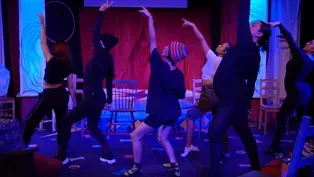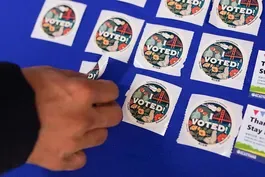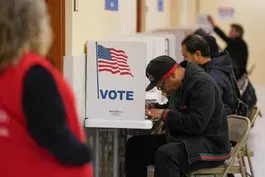
Family members of hostages give opposing views on Gaza war
Clip: 3/5/2024 | 9m 55sVideo has Closed Captions
Family members of hostages offer opposing perspectives on war in Gaza
Negotiators met in Cairo for a second day on Tuesday to try and secure a deal between Israel and Hamas that would see a pause in fighting in Gaza and the release of Israeli hostages. The U.S. had hoped to secure a deal before the start of Ramadan next week, but so far there’s been no breakthrough. Nick Schifrin looks at the status of those talks and speaks with family members of two hostages.
Problems with Closed Captions? Closed Captioning Feedback
Problems with Closed Captions? Closed Captioning Feedback
Major corporate funding for the PBS News Hour is provided by BDO, BNSF, Consumer Cellular, American Cruise Lines, and Raymond James. Funding for the PBS NewsHour Weekend is provided by...

Family members of hostages give opposing views on Gaza war
Clip: 3/5/2024 | 9m 55sVideo has Closed Captions
Negotiators met in Cairo for a second day on Tuesday to try and secure a deal between Israel and Hamas that would see a pause in fighting in Gaza and the release of Israeli hostages. The U.S. had hoped to secure a deal before the start of Ramadan next week, but so far there’s been no breakthrough. Nick Schifrin looks at the status of those talks and speaks with family members of two hostages.
Problems with Closed Captions? Closed Captioning Feedback
How to Watch PBS News Hour
PBS News Hour is available to stream on pbs.org and the free PBS App, available on iPhone, Apple TV, Android TV, Android smartphones, Amazon Fire TV, Amazon Fire Tablet, Roku, Samsung Smart TV, and Vizio.
Providing Support for PBS.org
Learn Moreabout PBS online sponsorshipAMNA NAWAZ: Israeli war cabinet member Benny Gantz is still in Washington today meeting with top U.S. officials, including Secretary of Defense Lloyd Austin.
His trip comes as negotiators met for a second day in Cairo, working towards a deal between Israel and Hamas to pause fighting in Gaza and free Israeli hostages.
But, so far, there's been no breakthrough.
Nick Schifrin looks at the status of the talks and speaks to two hostage family members.
NICK SCHIFRIN: Negotiations between Israel and Hamas are at a critical moment.
U.S. officials tell me that Hamas has responded to the most recent outline that would pause the war for six weeks for the release of 35 to 40 hostages, but it will take some time for Israel and international mediators to reply.
The U.S. had hoped to secure a deal before the Islamic holy month of Ramadan begins next week.
Today, once again, President Biden put the onus on Hamas.
JOE BIDEN, President of the United States: It's in the hands of Hamas right now.
The Israelis have been cooperating.
There's an offer out there that's rational.
We don't know what -- we will know in a couple of days if it's just going to happen.
But we need the cease-fire.
NICK SCHIFRIN: Central to that cease-fire are the lives of 100 or so Israeli hostages who've been held in Gaza for nearly five months and their families waiting for their release.
But not all the families agree on how to best bring their loved ones back home.
I'm first joined by Yair Glick, the cousin of Eitan Mor, who was a security guard at the Nova Festival when Hamas terrorists launched their assault.
Thank you very much, Yair Glick.
Welcome to the "NewsHour."
I appreciate it.
Do you believe, bottom line, that if a deal is possible this week, the Israeli government should accept it?
YAIR GLICK, Cousin of Israeli Hostage: Hi.
Thank you for having me.
And, no, I think that we should not have a deal with terrorists.
We should not negotiate with them.
We want them all back.
We want all our families come back.
But we think that we need to do it in a different way.
NICK SCHIFRIN: So what is that different way?
What do you believe is the best way to get Eitan Mor back?
YAIR GLICK: We need to make Hamas, the terrorist that attacked Israel, kidnapped people, tortured people, murdered people, we need to force them to give all the people back.
We cannot let these terrorists to get what they want and what they did it for.
NICK SCHIFRIN: Do you believe that the way the Israeli government is going about the campaign in Gaza, do you believe that is beginning to force Hamas to do, as you say, to avoid giving Hamas - - giving into Hamas demands?
YAIR GLICK: Yes, we can see that we are really continuing to fight Hamas and we are winning there.
We are forcing them to go back and to hide.
And we need just to continue it.
We don't want the terrorists to be there.
We don't want the terrorists to be able to do again these terrible attacks.
And we can continue doing it and trying all the time, of course, to take care of the people in Gaza.
NICK SCHIFRIN: And what do you say to the people who point out that the IDF has managed to release a few hostages, but the vast majority of hostages who have been released came during a cease-fire that the Israeli government accepted back in November, when more than 100 hostages were released?
YAIR GLICK: So, first, I think that we should look on the differences between the deals.
So, during November, we get one week of cease-fire.
Now they are offering six weeks to give us less people.
During this time, they had time to get more weapons, more ammo, these kind of deals.
We just give them more will to do it again and again.
NICK SCHIFRIN: The argument you're making is echoed by the Tikva Forum, a group of families that was created by Eitan's father.
Many other families believe that Prime Minister Benjamin Netanyahu is not doing enough to prioritize the securing of hostages.
Do you believe that you're in the minority?
YAIR GLICK: I think that yes, because when you're talking about families of hostages, I think that the rational and the normal reaction will be to do whatever they need to get them back.
And I can't judge them, and I really understand them.
But I'm not talking about the families.
I'm talking about the country.
I'm talking about the decision-makers.
And they need to think in a different way.
They need to be rational, not emotional.
So, we need to think about the future.
We need to think what will happen next time.
NICK SCHIFRIN: And finally, Eitan Mor, your cousin, is 23 years old.
What should we know about him?
YAIR GLICK: So he's really a young, young man that's just starting his life.
He's turning from teenage to a man.
And he moved to his own apartment and started thinking about studying, learning what to do.
And now this terrible thing happened.
And we need to talk about how to get him out of Gaza.
NICK SCHIFRIN: Yair Glick, thank you very much.
YAIR GLICK: Thank you.
NICK SCHIFRIN: And now we turn to Jonathan Dekel-Chen.
His son Sagui was kidnapped by Hamas terrorists from Kibbutz Nir Oz, where one in four people were either killed or kidnapped on October 7.
Jonathan Dekel-Chen, thank you so much.
Welcome back to the "NewsHour."
As I have just laid out, there is a deal that Israel and Hamas are negotiating that would stop the war for about six weeks, at least in the first round, for the release of 35 to 40 hostages or so.
Do you believe the Israeli government, bottom line, should accept that deal?
JONATHAN DEKEL-CHEN, Father of Hamas Hostage: I believe the Israeli government should be doing its job and returning as many of the hostages as possible in as early time frame as possible.
Right now, we don't know how many are still alive.
Every day, every hour, the possibility increases that there are fewer of them to return alive.
So, yes, I'm absolutely in favor of it.
NICK SCHIFRIN: Do you believe the Israeli government right now is doing all it can to release your son and the remaining hostages?
JONATHAN DEKEL-CHEN: It's hard for me to give you a solid answer on that.
We will only know that they have done everything that they must do when all of the hostages that are alive and the bodies, unfortunately, of those that we already know Hamas is holding, when they all return home.
That will be the sign that the Israeli government has done all that it must to bring back these people and not sacrifice them a second time after October 7.
NICK SCHIFRIN: The Israeli government and its supporters have argued that military pressure needs to increase in order to convince Hamas to release the hostages.
Do you agree?
JONATHAN DEKEL-CHEN: Unfortunately, I don't.
I mean, the Israeli soldiers, these are my brothers, my sons, and I completely support what they are trying to do.
However, there's no proof of concept that military action is going to get any of the hostages home alive.
The three hostages that were rescued by the IDF are the exception that proves the rule.
The rest of the, we hope, 130-something hostages are being held very closely by Hamas in the tunnels.
And so this idea that Israeli soldiers are going to go knocking on Sinwar's door and he will then turn over the hostages, it's fantasy.
There's absolutely no proof.
And, on the contrary, there's proof that before giving them up, the Hamas leadership will, in all probability, execute them all.
So, no, absolutely, I do not support that idea that military action prioritized or certainly on its own is going to get even one hostage home alive.
NICK SCHIFRIN: Do you believe that you represent the vast majority of the families of those being held in Gaza?
JONATHAN DEKEL-CHEN: Absolutely,there's no question, also, the vast majority of the people of Israel.
We see that in the streets.
We see that in the press.
There's no question that Israelis understand that we simply cannot be whole again after the disaster of October 7, the disaster overseen by our own government.
We can only be whole again when the hostages come home.
We won't be able to look at each other if, God forbid, the hostages are not returned alive or those whose bodies remain in Gaza, for them to be returned.
NICK SCHIFRIN: On October the 7th, your son fought off Hamas terrorists trying to protect his wife and two daughters.
Your daughter-in-law has subsequently had a baby.
She was pregnant on October the 7th.
What do you want people to know about your son?
JONATHAN DEKEL-CHEN: Well, my son is the kind of guy where, not just our community, our kibbutz community, not just our country, but I really do believe that large parts of the world can benefit by people like that being active parts of this world, of doing good, of creating, of constructing.
And that is my son in a nutshell.
And you're right.
The time has come for him to be reunited now with his three daughters and his wife.
His wife is truly the hero of our family story, both surviving an impossible ordeal on October 7 and keeping the lives of her daughters moving forward, despite this utterly impossible situation that we find ourselves in.
NICK SCHIFRIN: Jonathan Dekel-Chen, thank very much.
JONATHAN DEKEL-CHEN: Thank you.
Austin theater company preserves Latin American culture
Video has Closed Captions
Austin theater company works to preserve Latin American culture (2m 55s)
‘Burn Book' explores a life covering the tech industry
Video has Closed Captions
‘Burn Book' explores Kara Swisher’s life and complicated relationship with tech industry (6m 58s)
California voters decide consequential U.S. Senate race
Video has Closed Captions
California voters decide consequential U.S. Senate race (6m 32s)
How Super Tuesday may impact the 2024 presidential race
Video has Closed Captions
How Super Tuesday may impact the 2024 presidential race (8m 42s)
What's behind the stunning rise in alcohol-related deaths
Video has Closed Captions
What's behind the stunning rise in alcohol-related deaths (5m 51s)
Providing Support for PBS.org
Learn Moreabout PBS online sponsorshipSupport for PBS provided by:
Major corporate funding for the PBS News Hour is provided by BDO, BNSF, Consumer Cellular, American Cruise Lines, and Raymond James. Funding for the PBS NewsHour Weekend is provided by...
















